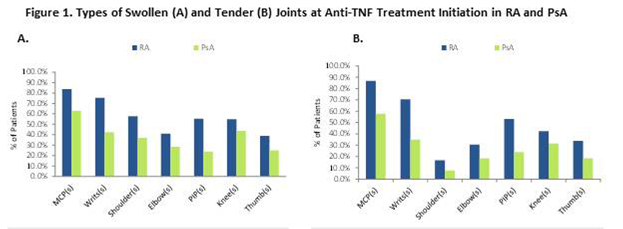Session Information
Date: Tuesday, November 10, 2015
Title: Rheumatoid Arthritis - Small Molecules, Biologics and Gene Therapy Poster III
Session Type: ACR Poster Session C
Session Time: 9:00AM-11:00AM
Background/Purpose: :
Unlike rheumatoid arthritis (RA), the pattern of joint involvement in psoriatic arthritis (PsA) is usually asymmetric. Furthermore, PsA may demonstrate oligoarthritis or polyarthritis, while RA usually manifests in multiple joints. The aim of this study was to describe the most commonly affected joints in patients with RA and PsA at baseline and after 6 months (mos) of treatment with infliximab (IFX) in a clinical practice setting.
Methods :
BioTRAC is an ongoing, prospective registry of patients initiating treatment for RA, ankylosing spondylitis, or PsA with IFX as first biologics or after having been treated with a biologic for <6 mos. RA patients treated between 2002-2012 and PsA patients treated with IFX between 2005-2012 were included. Based on the 28-joint involvement 7 groups were created: shoulder(s), elbow(s), metacarpophalangeal (MCP(s)), wrist(s), proximal interphalangeal (PIP(s)), knee(s), and thumb(s). The impact of treatment on joint swelling/tenderness was assessed with the McNemar test while the Chi-square test was used to compare the affected joints between disease groups.
Results:
832 RA patients (mean age: 55.8 yrs disease duration: 10.2 yrs) and 92 PsA patients (age: 48.7 yrs; disease duration: 6.8 yrs) were included. At baseline, mean DAS28, SJC28 and TJC28 in RA vs. PsA patients were 5.8 vs. 4.1 (P<0.001), 10.7 vs. 4.0 (P<0.001), and 12.6 vs. 5.9 (<0.001), respectively. Among RA patients, the joints most commonly swollen at baseline were MCPs (86.8% of patients), wrists (70.5%), and PIPs (53.2%). Knees, thumbs, elbows and shoulders were swollen in 42.3%, 33.7%, 30.5%, and 16.7% of patients, respectively (Figure 1A). With respect to tenderness, MCPs were tender in 83.8% of patients, wrists in 75.3%, shoulders in 57.8%, knees in 54.8%, PIPs in 55.3%, thumbs in 38.8%, and elbows in 41.0% (Figure 1B). Statistically significant differences were observed between RA and PsA patients both in the frequency of joint swelling/tenderness, which were lower in PsA, and the profile of affected joints. Among PsA patients, MCPs, wrists, and knees were the joints most commonly swollen, affected in 57.6%, 34.8%, and 31.5% of patients, respectively; MCPs, knees, and wrists were the joints most commonly tender (63.0%, 43.5%, and 42.4% of patients, respectively). Upon 6 mos of treatment, significant improvement in swelling/tenderness in all the most commonly affected joints in both RA and PsA patients was observed. The joints most resistant to treatment, still remaining affected at 6 mos, were MCPs in both patient groups.
Conclusion:
Significant differences exist in both the frequency and the profile of swollen and tender joints in RA and PsA patients although both diseases shared the MCPs as the joint most commonly affected and most resistant to treatment. Treatment with IFX for 6 mos resulted in a significant reduction in the 28-swollen and tender joint counts in both RA and PsA patients
To cite this abstract in AMA style:
Jovaisas A, Starr M, Choquette D, Zummer M, Arendse R, Sholter D, Faraawi R, Rodrigues J, Rampakakis E, Sampalis JS, Nantel F, Lehman AJ, Otawa S, Shawi M, Maslova K. Profile of Joint Involvement over Time in Rheumatoid Arthritis and Psoriatic Arthritis Patients Treated with Anti-TNF in a Real-World Setting [abstract]. Arthritis Rheumatol. 2015; 67 (suppl 10). https://acrabstracts.org/abstract/profile-of-joint-involvement-over-time-in-rheumatoid-arthritis-and-psoriatic-arthritis-patients-treated-with-anti-tnf-in-a-real-world-setting/. Accessed .« Back to 2015 ACR/ARHP Annual Meeting
ACR Meeting Abstracts - https://acrabstracts.org/abstract/profile-of-joint-involvement-over-time-in-rheumatoid-arthritis-and-psoriatic-arthritis-patients-treated-with-anti-tnf-in-a-real-world-setting/

